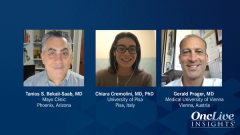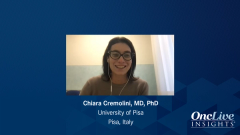
Using ICI Therapy in MSI-High mCRC
Chiara Cremolini, MD, PhD, leads the discussion on the advantage of treating MSI-high metastatic colorectal cancer with immune checkpoint inhibitors.
Episodes in this series

Tanios S. Bekaii-Saab, MD: Let’s assume this patient was MSI [microsatellite instability] high—she had an MSI-high tumor—regardless of the other elements. This was sporadic, so a non–Lynch syndrome, MSI-high tumor. What is the treatment paradigm in your part of the world?
Gerald Prager, MD: Chiara, do you want to start, or should I?
Chiara Cremolini, MD, PhD: I’ll change my mind in the case of microsatellite-instable tumor. In this case, my first choice would be a checkpoint inhibitor. In my daily clinical practice, this means pembrolizumab. Based on the results of the KEYNOTE-177 trial, I have this option available for my patients. The advantage of using a checkpoint inhibitor instead of the previous standard of care, which was the chemotherapy plus a biologic agent, is clear. There is also a chance of cure for some of our patients with metastatic colorectal cancer, so this is a no-brainer. I’ll go for an immune checkpoint inhibitor.
We’ve also seen very interesting results from the CheckMate142 trial. It was a phase 2 singular trial, with low-dose ipilimumab plus nivolumab in the first line in microsatellite-instable tumors. There were just 45 patients, but there was not such a terrifying safety profile. It was manageable. The results in terms of objective response and disease control rates were even more interesting and promising than what was observed with the anti–PD-1 alone. Even if a cross-trial comparison is not always appropriate for the future, this combination will add value to the treatment of MSI-high patients.
Tanios S. Bekaii-Saab, MD: Gerald, how about your neck of the woods?
Gerald Prager, MD: Totally agree. In Europe, it’s easy because for first lines in untreated, metastatic, MSI-high patients, we have pembrolizumab approved. Reimbursement, at least in Austria, is not an issue. For pretreated patients, in Europe we also have approved the combination with nivolumab and ipilimumab, based on the CheckMate142 cohort in pretreated patients. We have an option for the first line. We have an option for non immunotherapy, pretreated patients in the second line if they’re MSI-high. By the label, we have no choice. But I agree with Chiara that more data in the future will probably give us an option in first line to combine immunotherapies, either with other checkpoint inhibitors or with chemotherapy. But these days are pending.
Tanios S. Bekaii-Saab, MD: I totally agree. In the United States you have access to both, but I favor pembrolizumab for obvious reasons. It has more solid data. I always worry about those phase 2, single-arm studies. This study was in the setting of having a nivolumab arm and a nivolumab-ipilimumab arm that weren’t compared, that weren’t randomized. The way I discuss it with junior colleagues is, if you’re in clinic and you have the 75-year-old patient with borderline performance status, guess which arm you’re going to pick? If have the super performing younger patient, take another guess. Introduce that selection bias. When you have a study that gives you the option to choose, that’s even more than if it was a straight phase 2 without another arm available. So we’ll wait. More toxicities, higher cost. As you guys mentioned, we cure 30% to 40% of those patients with single-agent pembrolizumab. They’ll never see chemotherapy. They’ll never need more intense therapy, so why put them through that?
Transcript Edited for Clarity







































